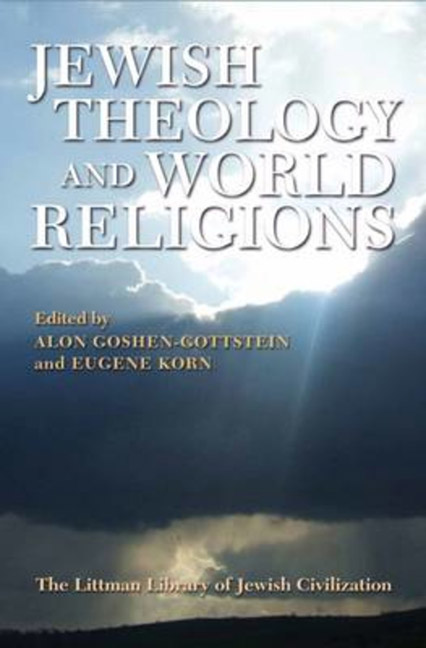Book contents
- Frontmatter
- Dedication
- Preface
- Contents
- Note on Transliteration
- Towards a Jewish Theology of World Religions: Framing the Issues
- PART I PHILOSOPHICAL PERSPECTIVES ON JEWISH PLURALISM
- PART II JUDAISM AND THE OTHER
- PART III JUDAISM AND WORLD RELIGIONS
- Concluding Reflections
- Notes on the Contributors
- Index
Concluding Reflections
- Frontmatter
- Dedication
- Preface
- Contents
- Note on Transliteration
- Towards a Jewish Theology of World Religions: Framing the Issues
- PART I PHILOSOPHICAL PERSPECTIVES ON JEWISH PLURALISM
- PART II JUDAISM AND THE OTHER
- PART III JUDAISM AND WORLD RELIGIONS
- Concluding Reflections
- Notes on the Contributors
- Index
Summary
AN IMPULSE to compose concluding reflections arose as I reviewed the chapters in their final form. After reading them, I felt a profound sense of gratitude for all the project's collaborators—the contributors and especially Eugene Korn, whose initiative and drive were the necessary condition for this volume to take shape. I also realized what a rich collection we have produced and how much we have accomplished intellectually, religiously, and spiritually by bringing the contributors together and completing this project. More precisely, it was the high quality of the essays that led me to reflect on whether we can articulate conclusions emerging from our project, beyond the individual contributions. It is not in the nature of this type of project to have conclusions, but I can point to where the discussion has moved forward, how it has been reframed, and how it has opened up new perspectives. I think it is best to offer such reflections personally—in the first person singular. Reflections and impressions are subjective, relating always to a previous point of reference associated with an individual. Identifying core themes and revisiting discussions as rich as ours are both intuitive and selective and rely on the reviewer's personal choices. While my colleagues may agree with some or most of what follows, each one would probably offer his or her concluding reflections and highlight different dimensions of the project. What follows is therefore my way of saying thank you to all my collaborators and of acknowledging where my thinking has moved forward, and how a synthetic view of our project allows me to continue thinking about the issues that initially drove this project.
WORLD RELIGIONS AND THE RELIGIOUS OTHER: TWO PROJECT FORMULATIONS
When the project was originally conceived, it was entitled ‘Towards a Jewish Theology of the Religious Other’, as Meir Sendor reminds us in his quote and subsequent challenge of a key sentence from the mission statement of the Scranton conference. The title of this volume refers not to the ‘religious Other’, but to ‘world religions’. We have learned that there are two different discourses that flow from each of these conceptualizations.
- Type
- Chapter
- Information
- Jewish Theology and World Religions , pp. 317 - 328Publisher: Liverpool University PressPrint publication year: 2012

